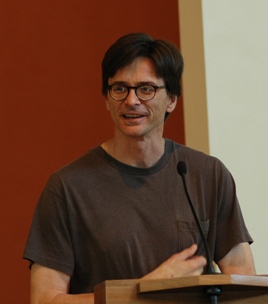 HARVARD, Mass. – Robert Jensen, an associate professor of journalism at the University of Texas at Austin, gave a talk last night as part of the University’s annual “Take Back the Night” movement that condemned pornography as “the depraved and even apocalyptic embodiment of society’s ills,” according to an article in the Harvard Crimson.
HARVARD, Mass. – Robert Jensen, an associate professor of journalism at the University of Texas at Austin, gave a talk last night as part of the University’s annual “Take Back the Night” movement that condemned pornography as “the depraved and even apocalyptic embodiment of society’s ills,” according to an article in the Harvard Crimson.
Jensen blamed capitalism, white supremacy and racism for the spread of increasingly violent heterosexual pornography, telling the audience, “Pornography is what the end of the world looks like.” The Crimson reported that the professor’s lecture was promoted as an opportunity to advance dialogue about sexual violence.
Oddly, the writer notes a particularly uncomfortable reaction among some of the students when, as Jensen started describing the five most commonly produced sex acts, “many women and several men in the audience looked visibly shocked and disgusted. Four people left the lecture hall.” This reaction seems to contrast sharply with that of other university campuses around the nation, several of which have hosted screenings of Digital Playground’s recent release, “Pirates II: Scagnetti’s Revenge.”
Jensen may be a vocal and enthusiatic critic of pornography and the “sexual exploitation industry,” and some of his rhetoric may be inflammatory, but there is a decided methodology supporting his campaign against a cultural phenomenon he sees as epidemic and ultimately corrosive. Indeed, in a 2007 interview with mediamouse.org, he provided a rther detailed explanation of his philiosophy of sexual exploitation and pornography.
In the following excerpt, he explains how he believes the conversation about pornography needs to be framed going forward.
“For years, the debate about pornography in the culture was between conservative, often religious, objections to pornography and liberal defenses of pornography, one arguing that the this kind of sex was immoral and innapropriiate – implicitly, sex should be confined to the heterosexual marriage – and the other side saying, no, any sexual expression is okay between consenting adults.
“Well, what exploded that kind of argument was the feminist critique in the late 1970s and early 80s, which said, no, this isn’t about imposing some narrow view of sexuality morality, nor is it about sexual expression or freedom. It’s about within in a male-dominant society how sex is one place where men dominate. That is, where sexuality becomes a site of struggle. It’s about the eroticizing of domination and subordunation. Well, that for me totally changed, and sort of blew the door off that old liberal versus conservative debate. I thought it was the most productive way to engage the question of pornography and the sexual exploitation industries more generally.
But we see how fast both the liberal side and conservative side rejected feminist critiques and were happy to go back to that old liberal and conservative debate, which is now where we’re stuck again, with one added twist that so much of the conversation now about pornography now in this culture, because pornography has become so normalizes, is simply about the economics, the business of pornography. So you still have this liberal and conservative debate going on, but within this culture that sort of acknoledges that porn is just one more industry.
“Meanwhile, I think the real way to understand and explore the issue, the feminist critque of pornography, has been marginalized, So a lot of what we’re doing now is trying to bring that back into the debate, and I think it’s good for women, I think it’s good for man and I think it’s good for the culture more generally.”
For those in the adult entertainment industry who believe that their most ardent enemies are comprised of religious extremists and opportunist politicians, Jenkins should provide a wake-up call, not because his basic arguments are novel, since admittedly they are built on ideas first espoused a generation ago, but because he represents a new kind of messenger, younger, more seemingly reasonable and not counchind in the irrenconcilable hostility that an Andrea Dworkin brought to the fight.
Jensen may make similar claims, but he dips them first in honey.












No Comment